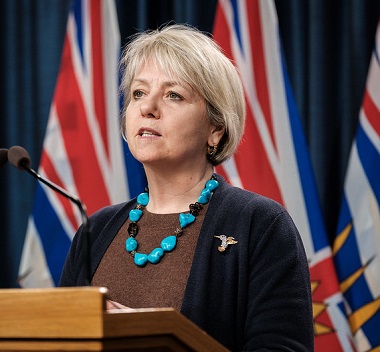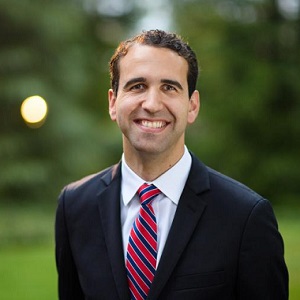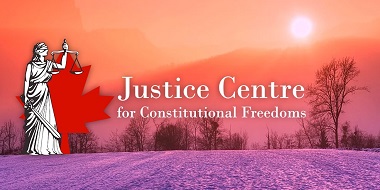
Dr. Bonnie Henry extended Public Health Orders indefinitely February 5. Province of BC photo
With Lent beginning next Wednesday (February 17), many are hoping BC government restrictions on worship gatherings will be eased in time for Easter.
Dr. Bonnie Henry announced February 5 that the Public Health Orders will continue indefinitely, though she did suggest that we might be able to resume faith services and other gatherings by the end of the month.
Seeking clarity
However, she was far from making promises and many religious freedom experts are questioning the degree to which the provincial government has curtailed the rights of faith groups.
Most recently, Catholic lawyers have raised the issue.
A News 1130 report February 8 began:
Some religious leaders are seeking more clarity from Provincial Health Officer Dr. Bonnie Henry and Health Minister Adrian Dix now that current public safety orders have been extended indefinitely.
One of the groups hoping a ban on in-person services will be lifted is the St. Thomas More Catholic Lawyers Guild of B.C.
Committee member Robert Piasentin wants to know why it’s okay to watch the Super Bowl at a pub or take a day trip to Whistler, but not attend mass anywhere in British Columbia.

Robert Piasentin (above) and Warren Smith are listed as contacts on the letter sent by the St. Thomas More Catholic Lawyers Guild of B.C. to Dr. Bonnie Henry and Adrian Dix.
A February 9 article in The B.C. Catholic (“Catholic lawyers want end to BC’s ‘inconsistent’ ban on worship”) noted that:
Catholic lawyers in the Archdiocese of Vancouver are adding their voices to the growing numbers calling for the B.C. government to end its ban on worship services.
The St. Thomas More Catholic Lawyers Guild of B.C. is preparing a formal request to the Ministry of Health to ease the current restrictions on churches in time for Easter.
Lawyer Warren Smith said the guild is acting now after receiving no response to a letter sent in December to Provincial Health Officer Dr. Bonnie Henry and Health Minister Adrian Dix. The letter asked the government to allow church services to resume, even if attendance is limited to 50 people. . . .
Archbishop J. Michael Miller said the archdiocese “greatly appreciates” the initiative of the Catholic lawyers, who he said are “playing an active and responsible role” as citizens of this country.
Go here for the full article.
Charter rights
The Catholic lawyers’ letter includes this portion:
As is well known, both the Canadian courts and various levels of government in Canada have routinely found religious experience to be a fundamental human right. In Canada, this right is enshrined in section 2(a) of the Charter of Rights and Freedoms.
The right to religious freedom in Canada involves not only the right of an individual to believe in a particular religious system, but also the right “to manifest religious belief by worship and practice.”
Religious freedom is not an absolute right and it is acknowledged that circumstances may arise when that freedom may be permissively impaired.
However, section 1 of the Charter of Rights and Freedoms provides that the impairment must be “demonstrably justified in a free and democratic society.” The Courts have long held that justification of an infringed Charter right involves consideration of the impairment’s proportionality, minimal impairment and reasonable accommodation. . . .
[W]e respectfully remind the Provincial Health Office and the Province of British Columbia that there is no Charter right or protection to attend yoga classes, frequent local pubs or buy luxury goods on Robson Street. However, British Columbians do have a Charter right to religious freedom.
Similar points have been made by several individuals and groups before now.

Brian Bird wrote two opinion pieces for The Vancouver Sun questioning the government’s approach.
UBC law professor Dr. Brian Bird wrote two comments for The Vancouver Sun:
- November 27, 2020: Banning religious gatherings defies common sense, and perhaps the Constitution
- January 2, 2021: The ban on in-person worship continues in BC, along with the wait for a compelling reason why
Bird, assistant professor at the Peter A. Allard School of Law, made significant contributions to a valuable series of videos by the Christian Legal Fellowship and the Forgotten Freedoms Project on The Forgotten Freedoms of Section 2 of the Charter and is one of three co-editors of a book released in October: The Forgotten Fundamental Freedoms of the Charter (LexisNexis, 2020).
The executive directors of both the BC Civil Liberties Association and the Canadian Civil Liberties Association wrote an open letter to provincial health authorities December 15, asking them to allow in-person worship and to explain any restrictions preventing faith groups from gathering.
The Justice Centre for Constitutional Freedoms (JCCF) filed a petition in B.C. Supreme Court January 7 arguing that current health orders “unjustifiably infringe the rights and freedoms” of BC residents under the Canadian Charter of Rights and Freedoms. The challenge is set to be heard March 1 – 3.
 The JCCF is representing over a dozen individuals and faith communities, including three churches in the Fraser Valley: Free Reformed Church of Chilliwack, Immanuel Covenant Reformed Church in Abbotsford and Riverside Calvary Chapel in Langley.
The JCCF is representing over a dozen individuals and faith communities, including three churches in the Fraser Valley: Free Reformed Church of Chilliwack, Immanuel Covenant Reformed Church in Abbotsford and Riverside Calvary Chapel in Langley.
Seeking injunction
While the province has not responded to the St. Thomas More Catholic Lawyers Guild of B.C. (nor to Brian Bird and the BCCLA as far as I know), it is moving decisively against the dissident churches.
The province will make its application for an interlocutory injunction against the three Fraser Valley churches and their leaders to B.C. Supreme Court Chief Justice Christopher Hinkson on Friday (February 12).
A Vancouver Sun article posted February 10 began:
British Columbia’s provincial health officer and attorney general are asking for a court injunction ordering three churches to follow public health rules banning in-person religious services.
The application in B.C. Supreme Court comes after the churches filed a petition challenging the province’s prohibition on the services, arguing the ban violates people’s rights and freedoms. . . .
Dr. Bonnie Henry, the provincial health officer, considered and gave weight to the importance of religious freedom, as well as the mental health benefits to worshippers, but determined that the restrictions were necessary and proportionate, the province says in its reply to the petition.
Henry relied on evidence showing that transmission of the virus seems highest in settings of sustained interpersonal interaction indoors or in enclosed spaces, and loud talking, chanting and singing also increase spread, it says.
“There is no question that restrictions on gatherings to avoid transmission of SARS-CoV-2 limit rights and freedoms guaranteed by the Charter of Rights and Freedoms, as well as personal liberty in a more generic sense,” the province says.
“But rights and freedoms under the charter are not absolute. Protection of the vulnerable from death or severe illness and protection of the health-care system from being swamped by an out-of-control pandemic is also clearly of constitutional importance.” . . .
If the injunction is granted, it will enable police officers to detain anyone who violates the order and attends or hosts an in-person religious service at any of the churches.
Go here for the full story.
Patient compliance
The great majority of churches continue to follow provincial guidelines with good grace, even if not completely agreeing, in some cases, with the province.
For example, the Canadian Pacific District of the Christian and Missionary Alliance states under its ‘COVID-19 & the Church’ guidelines:
We encourage all of our church pastors to discuss with their Board of Elders, staff and leaders the ways to follow both the government’s directions in these matters. Our continued prayer is that the churches will be beacons of hope and life in their communities during this time as this is a moment for us to truly be the Church.
They also post a helpful five-page statement on ‘Pandemic Restrictions and Civil Disobedience,’ which begins:
As the pandemic persists, several churches in British Columbia are defying health authorities and conducting in-person worship services each Sunday. Some of those interviewed by the media appeal to a divine command to gather for embodied worship that trumps human authority as justification for their civil disobedience. Others accuse the government of overreach and appeal to Charter rights that enshrine religious freedom in Canadian law.
More broadly, we are all aware of the continuum of opinions present in Canadian society, often reflected in those who attend our churches, on other restrictions imposed by health authorities, and on the forthcoming vaccine, and so on. The word I’ve heard most frequently in both the media and personal conversation to describe our current circumstances in church and society is the term polarized, namely, to break into opposing factions or groupings (Merriam-Webster).
In highly polarized situations where individuals are unlikely to change strongly held opinions and where satisfying everyone is inherently impossible, sometimes the best one can do in service of others is simply to offer clarity on one’s stand. The purpose of this article is to provide that clarity on behalf of the staff team at the District Office. . . .
The heart of the matter
Love for the other trumps rights for myself. Voluntary self-surrender in the best interests of the other, as modelled by Jesus on the cross, is at the heart of the gospel. . . .
Go here for the full statement.
A number of leaders from churches and other faith groups have participated in dialogues with Dr. Robert Daum from the Simon Fraser University Centre for Dialogue. Premier John Horgan announced the initiative during a conference call with faith leaders December 14.
Daum was to facilitate five 90-minute conversations with approximately 12 spiritual communities, involving 25 – 30 people. I have not heard back from the provincial government about how the process is going, whether there will be more talks, etc.
Things we can agree on
John Stackhouse, public intellectual and solid Christian guide, offered some good insights February 9:
Churches and COVID-19:
I’ve held fire on this subject until now. But a number of folk have asked me to comment, and the court cases are increasing across Canada. So here goes, friends –
A few basics on which I’d like to think we can all agree. Can we?
• Christians should obey the authorities unless they are being ordered to defy the Word of God (Acts 5:29).
• The Word of God does not say that entire modern congregations must meet regularly, let alone every week, in their large-scale buildings. The early Christians met in homes. So do lots of Christians around the world today.
• The Word of God does not say that one’s spiritual health is imperiled by long-term lack of the eucharist. Some church traditions say that, but not the Bible. Moreover, hermits, prisoners, sailors, and many other Christians have lacked regular access to the eucharist. Are we to infer that their relationship with God was inescapably compromised?
• The Word of God rebukes those in the Christian community who say that “assembling together” is of no account (Hebrews 10:25). The normative practice of the New Testament is for Christians to regularly meet for worship and fellowship.
He goes on to deal with Charter rights, reasonable limitations on those rights, whether restrictions have been imposed equally, and more. Go here for the full comment, which would provide a helpful guide for in-church debates about church/state/pandemic issues.
